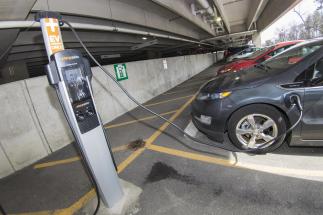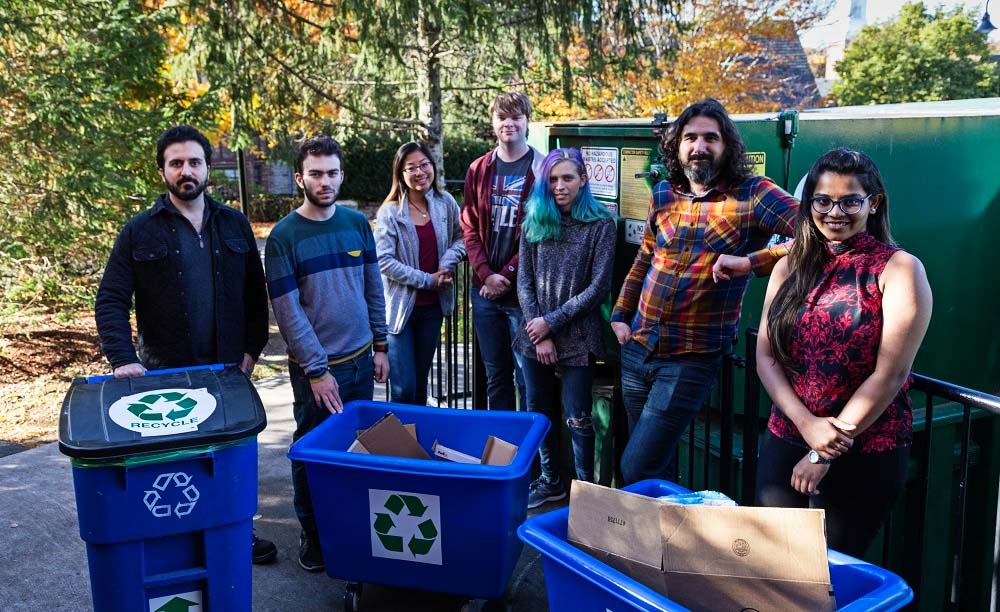Worcester Polytechnic Institute has received its second gold rating for successful sustainability efforts and initiatives, both on campus and beyond, from the Association for the Advancement of Sustainability in Higher Education (AASHE).
AASHE’s Sustainability, Tracking, Assessment, and Rating System (STARS) measures sustainability performance in all areas of higher education, and participants report achievements in academics, engagement, operations, planning and administration, and innovation and leadership. Institutions apply for the ratings every three years.
WPI scored 72.46 this year, up from 65.01 three years earlier. Scores are calculated on a 100-point scale, and WPI’s scores reflect activities reported to AASHE in May 2020 and May 2017.

“Preparing the submission is pretty extensive,” says Paul P. Mathisen, associate professor of civil and environmental engineering and director of sustainability at WPI. “It requires connecting with many different people on campus to pull this information together. We appreciate the efforts of everyone who contributed the data for the submission.”
STARS measures three elements of an institution’s efforts to calculate a sustainability score: environmental stewardship, economic security, and social justice. Gold is the second-highest rating in STARS, behind platinum. To earn platinum, an institution must receive a score of 85.
“It would be great to see WPI get platinum,” Mathisen says. “We’d like to keep improving and advancing our sustainability initiatives. It’s important to keep moving these efforts forward.”
Because STARS is a self-reported, transparent process, it allows for both internal comparisons and comparisons to similar institutions. Full reports, including WPI’s, are available online.
Mathisen notes that STARS is not just a competition with other institutions. In fact, he points out, WPI collaborates and coordinates with other institutions in the Worcester area to develop new ideas and to improve and meet sustainability goals.
Assessing things to improve upon
“STARS provides a nice way to assess how we’re doing with sustainability in general and to consider things we can improve upon,” says Mathisen. “It’s also a good opportunity to promote some of the work that we do here and some of our accomplishments. We’re proud of the efforts here. We’ve continued to make good progress.”
Actions that boosted WPI’s score since 2017 included an increased emphasis on sustainability in academic courses, the creation of new programs, improvements in energy conservation, and efforts to manage water use across campus. Some of the innovations included the Research, Discovery, and Innovation (REDI) Symposium, the Laboratory for Education and Applied Prototypes (LEAP), the Center for Global Public Safety, the “Critical Conversations” series of discussions, and the faculty learning communities in social justice.
Diversity, equity, and inclusion initiatives, including support for underrepresented groups and affordability and access, have also been helpful in boosting WPI’s rating, Mathisen says, noting an increase in social justice curriculum and initiatives around campus that are tied to sustainability. He adds that WPI has seen increased awareness in sustainability on campus in the last few years.
An example of a new initiative that’s intrinsically related to sustainability is the development of The Global School, he says. The Global School provides a framework for new programs, projects, and interdisciplinary research to help address the environmental, social, and economic challenges needed to maintain a sustainable world.
WPI has also updated its sustainability plan for the next five years.
“Our goal is to promote and support sustainability in all of these areas,” Mathisen says. “That helps to really keep people engaged. One thing we’d like to see is sustainability more closely related to our institutional learning outcomes.”
Improving sustainability in operations and facilities could include “green” purchasing—products and services that have a lesser or reduced effect on human health and the environment when compared with other products or services that serve the same purpose—minimizing waste, finding new opportunities for reuse, and reducing energy consumption, he says. He adds that there has been interest in installing electric vehicle charging stations on campus.
“Our goal," Mathisen says, "is to continue to advance the initiatives that reflect the breadth of sustainability and increase engagement in sustainability.”
—Melanie Thibeault




